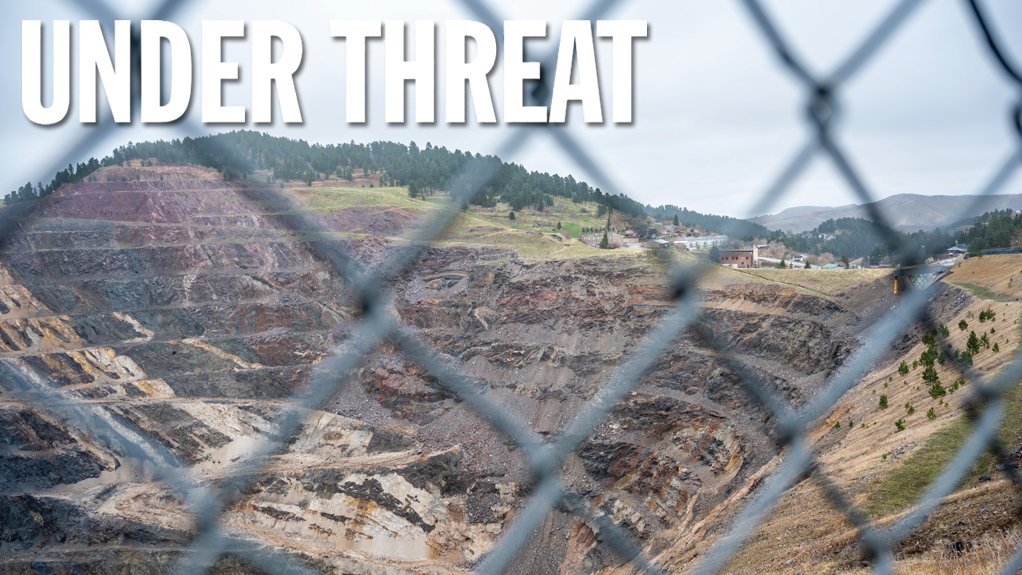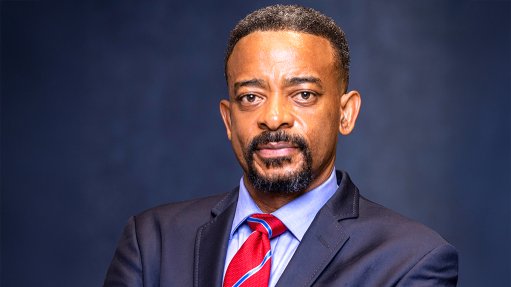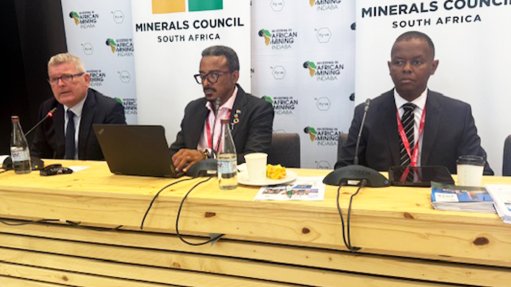Unprecedented crime levels threaten mining’s sustainability
Amid South Africa’s ticking of all the boxes for a fertile environment for organised crime – economic inequality, rampant crime, widespread government corruption and poorly performing State organs – addressing security is a key part of ensuring the sustainability of the mining industry.
During a webinar hosted by Creamer Media on February 28, experts unpacked the evolution of security risks for mines over the past 30 years, with mining and allied security professional Nash Lutchman averring that mining companies “are operating in an unprecedented safety risk environment”.
The multibillion-dollar transnational criminal syndicates perpetuating illegal mining and illicit trafficking of precious metals are but one of the security threats to the local mining industry, with fraud, money laundering and armed robberies also increasing.
These phenomena had lasting social, economic and environmental consequences, which affected not only individual mining companies but South Africa broadly, said consultancy PwC director Andries Rossouw when he he spoke during the webinar, quoting President Cyril Ramaphosa’s speech at the Investing in African Mining Indaba 2023, in which he likened the severity of criminality in mining to that of the energy and logistics crises.
Rossouw added that criminality was often among the top business risks cited by mining companies in the consultancy’s surveys, and that the lack of rehabilitation at some mining sites created not only opportunities for illegal mining but also a value chain for other criminal elements.
Lutchman noted that the crime landscape in South Africa, particularly in mining, had shifted from being a “nuisance type of phenomenon” to one that “has vastly taken over the fabric of social life and business, and become a raw threat impacting on lives at various levels”.
Gold mining and retreatment company DRDGOLD CEO Niël Pretorius agreed, adding that criminal acts varied – from subsistence criminals stealing pieces of metal to organised crime perpetrated by syndicates that steal mineral products or disrupt operations.
Pretorius believes that proportionality, in terms of fighting crime, has become a major topic in the industry, and that companies have started to respond to levels of crime in an area accordingly, although responding effectively without going overboard is a complex exercise that requires dedicated focus.
Lutchman elaborated that economies and communities in Southern Africa were plagued by socioeconomic inequality, with dwindling resources and corruption a common feature in the region, in addition to the widespread issue of disintegrating law and order that included people’s moving across borders and conducting illegal activities in other countries.
In this regard, South Africa was often a favourable destination for those wanting to engage in nefarious activities, given that it “provides a prosperous ecosystem for organised crime” and also offered economic opportunities for illicit trade through its many existing international trade routes.
South Africa was a “perfect storm” for criminal syndicates to embed themselves and operate unhampered, especially since most courts were backlogged and skills had been eroded across many government departments, making it all the more difficult to “pull back” from this daunting situation, he elaborated.
Directorate for Priority Crime Investigation (Hawks) organised crime provincial commander Brigadier Hennie Flynn said the police force’s approach had become focused on the whole value chain of the criminality in question, including secondary offences such as money laundering.
Although the Hawks have managed to dismantle various metal-smuggling syndicates in the country, Flynn pointed out that it took time and effort to gather sufficient evidence to successfully prosecute the apex role-players, and that authorities needed more support from the private security sector and the mining industry to mitigate this unrelenting threat.
The normal procedure for reporting illegal mining activity would be to do so at the nearest police station, but when the criminal activity is of such a nature that it involves high-level corruption, including the involvement of police officers, it is preferable to approach the anti-corruption units in the province or the Hawks directly, he suggested.
Planning & Engagement
In finding solutions to curb rising crime rates in the mining industry, Digby Wells Environmental CEO Graham Trusler stressed the importance of proper planning for mine closures, including social closure planning, which should feed into the physical reclamation.
South Africa has many abandoned, ownerless mines, which then become the State’s problem. The State not only has limited resources to spend on reclamation but it also takes a long time, if it happens at all.
Trusler said government often neglected to investigate and verify that active mining companies remained compliant with environmental requirements and closure initiatives, especially since the country’s increasing move towards renewable-energy development, for which the land could be used.
When mining started in Gauteng more than 100 years ago, there was little environmental regulation and, consequently, many mine dumps were developed in environmentally sensitive areas. Additionally, people put up houses very close to these sites, which resulted in environmental, safety and security risks.
In this regard, DRDGOLD often moves mine dumps or opens up reclaimed land for industrial purposes; however, when the land does not belong to DRDGOLD, but to the State, it often becomes a dumping ground for building material or other environmentally and/or socially damaging activities.
Pretorius strongly advocated for concurrent rehabilitation or “cleaning up as you go”, which responsible mining companies generally do.
He emphasised the importance of meaningful community engagement, including creating economic opportunities that could be sustained beyond the mine’s life, with Trusler highlighting the issue of there often being no other economic opportunities for mineworkers when mines closed down.
DRDGOLD’s initiatives encourage and contribute to communities being independent, which also helps to eliminate criminal activity in an area that is hampered by poverty. The company also helps to educate communities about the risks that illegal mining and theft pose to the sustainability of a mine or area, and to get people more involved in crime mitigation.
Pretorius also believes that enabling a functional informal economy in communities “already greatly reduces the risks of crime”.
Community members often harboured and equipped illegal mineworkers, consequently creating “huge” logistical and communication supply chains that aided criminal activity, added Lutchman.
He suggested that a strong community- facing strategy needed to be part of a company’s overall security strategy: “People need to understand their role in the sustainability of the mine and the community itself.”
Mining companies ought to have dedicated security professionals to deal with crime- related risks, he added.
Lutchman believes that security becomes problematic without strong, centralised governance and control functions to protect companies and the industry.
“A security strategy needs to be integrated in the core of the business and support functions . . . [and it] needs to extend beyond just tactical planning and response. Sometimes, the sales and marketing department needs its own security strategy, including dedicated security executives at C-suite level,” he said.
Flynn agreed that more crime intelligence was needed, stressing the importance of a widespread approach to deal decisively with crime in the mining industry, thus echoing Lutchman’s view that mining houses should have functions that mirror those of specialised investigation authorities. Even the Hawks are creating new capacities within the directorate, such as forensic accounting, to respond to ever-evolving risks in South Africa.
Lutchman hopes that South African authorities will become more involved in mitigating crime in the industry.
South Africa could learn from other African countries in terms of properly closing mines and affording ownership to artisanal mineworkers who could operate responsibly, Trusler said.
Rossouw concurred with the experts that, with mining contributing significantly to the economy, including local infrastructure in many instances, the sector ought to be supported to maintain its sustainability.
Article Enquiry
Email Article
Save Article
Feedback
To advertise email advertising@creamermedia.co.za or click here
Comments
Press Office
Announcements
What's On
Subscribe to improve your user experience...
Option 1 (equivalent of R125 a month):
Receive a weekly copy of Creamer Media's Engineering News & Mining Weekly magazine
(print copy for those in South Africa and e-magazine for those outside of South Africa)
Receive daily email newsletters
Access to full search results
Access archive of magazine back copies
Access to Projects in Progress
Access to ONE Research Report of your choice in PDF format
Option 2 (equivalent of R375 a month):
All benefits from Option 1
PLUS
Access to Creamer Media's Research Channel Africa for ALL Research Reports, in PDF format, on various industrial and mining sectors
including Electricity; Water; Energy Transition; Hydrogen; Roads, Rail and Ports; Coal; Gold; Platinum; Battery Metals; etc.
Already a subscriber?
Forgotten your password?
Receive weekly copy of Creamer Media's Engineering News & Mining Weekly magazine (print copy for those in South Africa and e-magazine for those outside of South Africa)
➕
Recieve daily email newsletters
➕
Access to full search results
➕
Access archive of magazine back copies
➕
Access to Projects in Progress
➕
Access to ONE Research Report of your choice in PDF format
RESEARCH CHANNEL AFRICA
R4500 (equivalent of R375 a month)
SUBSCRIBEAll benefits from Option 1
➕
Access to Creamer Media's Research Channel Africa for ALL Research Reports on various industrial and mining sectors, in PDF format, including on:
Electricity
➕
Water
➕
Energy Transition
➕
Hydrogen
➕
Roads, Rail and Ports
➕
Coal
➕
Gold
➕
Platinum
➕
Battery Metals
➕
etc.
Receive all benefits from Option 1 or Option 2 delivered to numerous people at your company
➕
Multiple User names and Passwords for simultaneous log-ins
➕
Intranet integration access to all in your organisation





















